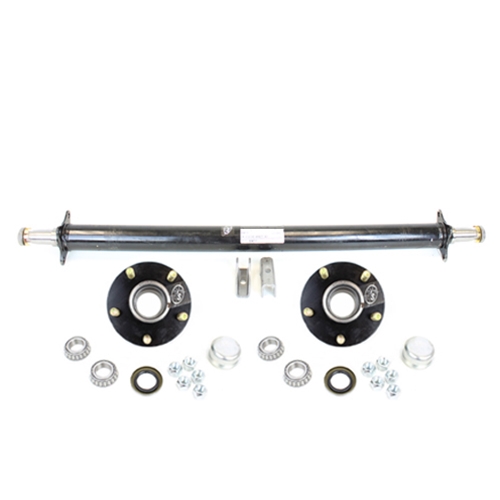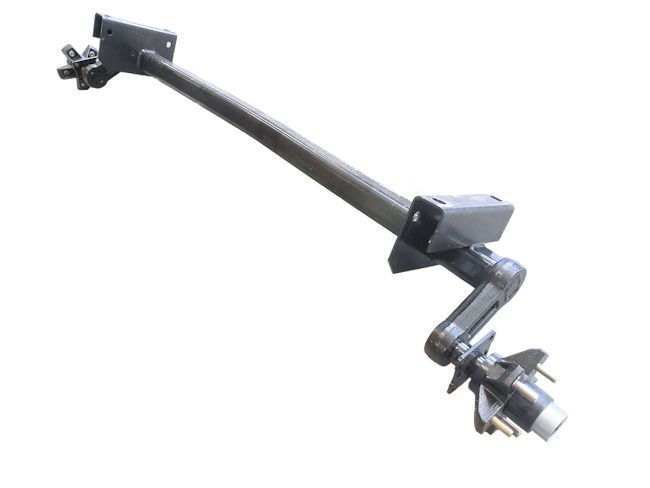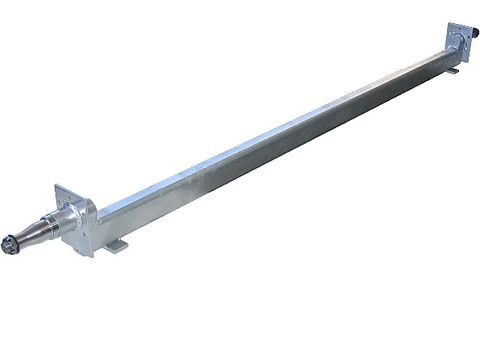Product Description
Manufacturer Trailer Parts Germany Trailer Axle/Heavy Truck Rear Axle
1.Company introduction:
ZheJiang CZPT Co.,Ltd is 1 of the major manufacturers specializing in the production of trailer axles
Our company has high technological background, sophisticated manufacturing technology, advances detection means, perfect quality assurance system. It is a specialized manufacturer integrating scientific research, design, production and sales
The production of “FUSAI” trailer axles passed the national authoritative department detection. The fatigue life is up to 1,500,000 times without damage-more than 3 times above the national standard, which is in the leading domestic level, and reach or exceed the international standards. Our products are popular not only in domestic markets, but all over the world. Since the products are designed and optimized by computer, they have reasonable structure, good braking performance, high strength and rigidity, strong bearing capacity, long service life, good service, trusted by the users.
2.”FUSAI” brand German type trailer axle is designed according to the related European standard. The rated loading capacity of this trailer parts is available from 12 ton to 18 ton.
1.German spindle design which is the widely used in the industry with proven performance
2.Low-alloy machined spindles, friction welded seamlessly, and overall heat treating process
3.Axle stubs and brake hubs are all CZPT forging, ensure they are more powerful and better steady
4.Special clone-shape design on the axle-shoulders, lessening stress concentration and enhancing anti-fatigue performance
5.Unique design on axle stubs (with a precise declination angel at both ends) to minimize tire wear
6.National and industry standard compliant set components
7.National Automobile Monitor and Inspection Center certified axle shaft that undergoes over 1.2 million times of Fatigue testing and built to meet or exceed national industry standards.
German type axle specifications:
|
Axle Type |
Max. Capacity (T) |
Track (mm) |
Brake (mm) |
Center Distance Of Spring Seat (mm) |
Axle Beam (mm) |
Center Distance Of Brake Chamber (mm) |
Stud
|
P.C.D (mm) |
Hole Diameter (mm) |
Total Length (mm) |
Recommended Wheel
|
Axle Weight (kg) |
|
FS- 12 |
12 |
1840 |
420* 200 |
≥980 |
150* 150 |
420 |
10* M22* 1.5 |
335 |
281 |
2158 |
7.5V-20 |
390 |
|
FS- 14 |
14 |
1840 |
420* 200 |
≥900 |
150* 150 |
430 |
10* M22* 1.5 |
335 |
281 |
2172 |
8.0V-20 |
417 |
|
FS- 16 |
16 |
1850 |
420* 200 |
≥900 |
150* 150 |
280 |
10* M22* 1.5 |
335 |
281 |
2245 |
8.5V-20 |
548 |
Attention:
1. Optional track length available.
2. Optional ABS and automatic slack adjuster available.
3. All the components are in common use of BPW.
4. Rights of changing product’s design and specification are reserved.
3.Scope of our business:
1.axles (German type axle, American type axle, Spoke axle, Axle without brake)
2.Suspension (Bogie suspension, Spoke suspension, Mechanical suspension)
3.Landing gear (Outboard or inboard)
4.Fifth wheel (2” 3.5”)
5.King pin (2” 3.5”)
6.Other axles and related parts (Low bed axle, hub, rims, spring, drum…)
Any question, contact Claire
ZheJiang CZPT Co., Ltd
| After-sales Service: | Available |
|---|---|
| Warranty: | 1 Year |
| Type: | Axle |
| Certification: | ISO/TS16949, CCC, DOT, ISO, CE |
| Loading Weight: | 12 Ton 14 Ton 16 Ton 18 Ton |
| ABS: | Optional |
| Customization: |
Available
| Customized Request |
|---|

How do innovations in axle technology impact trailer design and towing?
Innovations in axle technology have a profound impact on trailer design and towing capabilities. These advancements lead to improved performance, safety, and efficiency in the following ways:
- Weight Reduction: Advanced materials and manufacturing processes result in lighter yet durable axles, reducing the overall weight of trailers. Lighter trailers require less fuel to tow and can carry more payload within legal weight limits.
- Increased Load Capacity: Innovations like stronger axle materials and better load distribution systems allow trailers to carry heavier payloads while maintaining stability and safety.
- Suspension Enhancements: Axle technology improvements often go hand in hand with suspension innovations, providing smoother rides, better handling, and enhanced shock absorption. This is particularly valuable for cargo protection and driver comfort.
- Improved Durability: Enhanced axle components and coatings contribute to increased durability, reducing maintenance and replacement costs over the trailer’s lifespan.
- Safety Features: Innovations in axle technology can include safety features like integrated braking systems, anti-lock brakes, and sensors for monitoring axle performance and load conditions.
- Fuel Efficiency: Reduced weight and improved aerodynamics, often influenced by axle design, result in better fuel efficiency, reducing operating costs for fleet owners and individual haulers.
- Tire Wear Reduction: Axle advancements can lead to more even weight distribution on tires, reducing wear and extending tire lifespan. This not only saves money but also enhances safety on the road.
- Environmental Impact: Lighter and more fuel-efficient trailers have a smaller carbon footprint, contributing to reduced emissions and environmental benefits.
- Towing Stability: Axle innovations can improve trailer stability, reducing the risk of sway and rollovers, especially in adverse weather conditions.
- Adaptability: Many advanced axles allow for easy adaptation to various trailer types, making them versatile for different hauling needs.
Overall, innovations in axle technology play a crucial role in advancing the trailer industry. They provide economic, environmental, and safety benefits, making trailers more efficient, durable, and versatile for a wide range of towing applications.

What is the impact of trailer axle alignment on tire wear and performance?
Proper trailer axle alignment is crucial for tire wear and overall performance. Misaligned axles can lead to a range of issues:
1. Uneven Tire Wear:
– Axle misalignment can cause tires to wear unevenly. For example, excessive toe-in or toe-out (the angle of the tires relative to the trailer’s centerline) can lead to premature wear on the inner or outer edges of the tires. This not only reduces tire lifespan but also affects handling and safety.
2. Reduced Fuel Efficiency:
– Misaligned axles increase rolling resistance, which requires more energy to move the trailer. As a result, fuel efficiency can decrease, leading to higher operating costs.
3. Handling and Stability Issues:
– Axle misalignment can result in poor handling and reduced stability. Trailers may become more difficult to control, especially during braking and cornering, posing safety risks.
4. Overloading and Weight Distribution Problems:
– Misalignment can affect weight distribution. It may cause excessive weight on one axle, leading to overloading and potential legal issues. Balanced weight distribution is vital for safe and legal towing.
5. Axle Stress and Damage:
– Misalignment places additional stress on axles and suspension components. Over time, this stress can lead to component damage, potentially causing breakdowns and expensive repairs.
6. Trailer Drift:
– Misalignment can cause the trailer to drift or pull to one side, making it challenging to maintain a straight course, especially when driving at highway speeds.
7. Reduced Tire Lifespan:
– The combination of uneven tire wear, increased rolling resistance, and handling issues can significantly reduce the lifespan of trailer tires. This results in more frequent and costly tire replacements.
8. Safety Concerns:
– A misaligned trailer is less stable and more difficult to control, increasing the risk of accidents and compromising safety.
Alignment Solutions:
– To address axle misalignment, it’s essential to have the trailer inspected by a qualified technician. They can adjust the alignment by modifying the axle’s position and orientation. Precision alignment equipment is often used to ensure accuracy.
– Regular alignment checks and adjustments, as part of routine maintenance, can help prevent these issues and promote even tire wear and better performance.
– Properly aligned axles improve handling, safety, and tire longevity, making it a critical aspect of trailer maintenance.

How do trailer axles contribute to the stability and safety of a trailer?
Trailer axles play a critical role in ensuring the stability and safety of a trailer in various ways:
1. Weight Distribution:
– Trailer axles are strategically positioned to distribute the weight of the trailer and its cargo evenly. Proper weight distribution prevents overloading on one side, reducing the risk of swaying and instability during towing.
2. Load-Bearing Capacity:
– The load-bearing capacity of trailer axles is designed to support the weight of the trailer and its contents. Properly rated axles ensure that the trailer remains stable and doesn’t become overloaded, which can lead to accidents.
3. Handling and Maneuverability:
– The alignment and suspension of trailer axles impact the trailer’s handling and maneuverability. Well-balanced axles and properly adjusted suspension contribute to predictable and safe towing, especially during turns and lane changes.
4. Braking Control:
– Many trailer axles are equipped with braking systems, which enhance the trailer’s braking control. This is crucial for maintaining a safe following distance and preventing rear-end collisions when the towing vehicle brakes.
5. Suspension Systems:
– The suspension system of trailer axles, such as leaf springs or torsion systems, helps absorb shocks and vibrations. This contributes to a smoother ride and reduces the risk of cargo shifting or damage during transit.
6. Tire Stability:
– Trailer axles support the trailer’s tires, ensuring they make even contact with the road surface. This promotes tire stability and longevity, reducing the risk of blowouts or tire-related accidents.
7. Towing Vehicle Compatibility:
– Trailer axles are selected based on the towing vehicle’s capacity. Matching the axle’s capacity to the towing vehicle’s capabilities ensures a safe and stable towing experience.
8. Anti-Sway Mechanisms:
– Some trailer axles incorporate anti-sway mechanisms to reduce trailer sway caused by external factors like wind or uneven road surfaces. These mechanisms enhance safety and control while towing.
9. Compliance with Regulations:
– Trailer axles must meet safety and weight regulations. Ensuring compliance with these standards is crucial for safe and legal trailer operation.
– In summary, trailer axles are integral to the stability and safety of a trailer. Properly maintained and correctly rated axles, along with appropriate suspension and braking systems, are essential for safe towing, preventing accidents, and protecting both the trailer and its cargo.


editor by CX 2023-12-11